Taiwanese society is becoming ever more culturally and ethnically diverse -- the rise in the number of couples that draw from different ethnic or national backgrounds is testament to that.
When one walks down the street and notices such a couple, one wonders about their story -- how they overcame linguistic, cultural and sometimes even religious differences to be able to commit to each other in marriage.
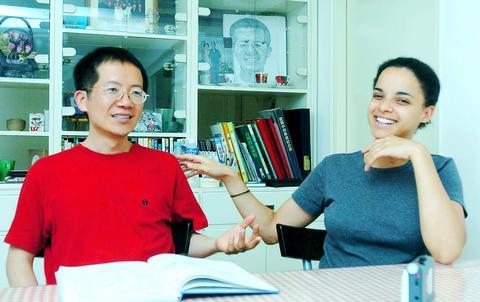
PHOTO: CHIANG YING-YING, TAIPEI TIMES
Conventional wisdom says marriage is formed by people with comparable backgrounds and similar experiences. The story of Ken Huang (
Brubaker, 26, was born in the east African nation of Tanzania to an American father and a Tanzanian mother. Her father was a Christian missionary there and Brubaker grew up in the missionary community. Her background meant that she spent half of her time growing up in Tanzania and the other half in the US. At the Brubaker home, English was the main language, followed by Swahili.
Huang, 45, was born in Sanhsia in Taipei County, but grew up in Taipei City speaking Mandarin and Hoklo (more commonly known as Taiwanese). After graduating from National Taiwan University's College of Law in the late 1970s, Huang spent five years participating in social movements, where he became acquainted with a number of well-known pan-green politicians today.
After moving away from his life as a political activist, Huang decided he would live away from the crowds and develop his own interests. Huang lived a hermit-like life for almost 10 years when he was in his 30s.
In November 2002, prompted by an interest in Chinese language and culture, Brubaker came to Taiwan to teach English at a private school. But marrying a Taiwanese man was not exactly part of her plans back then.
"The only thought that crossed my mind was anything could happen, but I was not looking [for a Taiwanese man]. Before I arrived in Taiwan, one Taiwanese couple in the United States told me that my personality is built to suit a Taiwanese man," Brubaker said.
One Sunday afternoon in December 2002, while Huang was playing percussion with some African-style drums in Da'an Park, Brubaker stopped and took a look at the people playing the music.
peaceful
"I glanced at Ken and the impression I got from him was his peaceful face," Brubaker said.
In early January last year, during their second encounter in the park, Huang and Brubaker sat next to one another and played the drums. At that moment, it dawned on Huang that marriage could be a possibility for him.
"As we played the drums together, we were in harmony. I felt that this girl understood me. Then, a weird thought dawned on me that I could actually get married and have children. I had always considered myself a loner, and never thought I was marriage material," Huang said.
Brubaker was Huang's first friend who was also from overseas.
For her part, Huang was attracted by Brubaker's gentleness and kind heart.
"It didn't occur to me that something could be there. He fitted into the category of a kind uncle," Brubaker wrote in a memoir when she got married.
Huang, a non-Christian, knew that Brubaker was a Christian and that this could pose a problem should he decide to pursue a deeper relationship with her.
But after going out on a number of outings, mostly in the company of friends, Huang developed a stronger interest in Brubaker.
"Back then, my English was even worse than it is now. I asked Brubaker if I could talk about the Bible with her, but she turned me down, as she felt it was a very intimate thing to do to share the insights of the Bible with someone else," Huang said.
Huang made a second attempt to approach Brubaker by visiting her church in Taipei.
"I attended church services just so that I could see Lillian. I asked the pastor there if my presence at the church was bothering others, and he said no," Huang said.
The pastor of that church, Tim Conkling, offered some helpful advice to Huang on how to interact and communicate with Brubaker.
Then, last July, Huang was baptized at Brubaker's church.
DATING
The following month, encouraged by Conkling, the pair started seeing each other in earnest.
"But Pastor Tim advised us to refrain from spending time in places where nobody else was present," Huang said.
Most of the time during their courtship, Huang said, the two hung out with other friends.
But one day last November, after receiving approval from Conkling, the two took a big step forward and decided to tie the knot.
"Finally, we came to a turning point after a two-hour talk with Tim Conkling. He knew clearly that I wanted to marry Lillian, so he said to her, `if you love Ken, you have my blessing,'" Huang said.
Several months after their November engagement, Huang and Brubaker stayed in the US to plan for their wedding, which was held on Feb. 7 in Brubaker's hometown in Pennsylvania.
"Getting married in the United States was such a time-consuming task, as every detail had to be considered and most things are hand-made, including our wedding invitation cards and flower arrangements," Huang said.
Although it snowed heavily the day before wedding day, the sky cleared on the day proper, and guests were able to travel long distances to attend the wedding ceremony.
"Two-hundred-and-nineteen guests showed up on our wedding day. Many of them drove hours, or flew from out of state to attend the wedding," Huang said.
Four months into their marriage, the couple is now living in a comfortable home on Xinyi Road in Taipei, and they are hopeful of expanding their family of two.
Huang works as a real-estate agent, while Brubaker is taking Chinese lessons.
"Once husband and wife have aligned their faith, the timing of having children is no longer an issue," Huang said.
Commenting on how he and his wife were able to look past their 19-year age gap, language barrier and cultural differences, Huang said that attitude matters the most.
"Pastor Tim once told us that the greatest barrier to communicating with others is one's attitude, and not cultural, language or other barriers. For instance, the divorce rate in the United States is still high regardless of the fact that people there share a common language," Huang said. "All marriages are mergers of different cultures and lifestyles and having a religious belief is something a couple can fall back on."
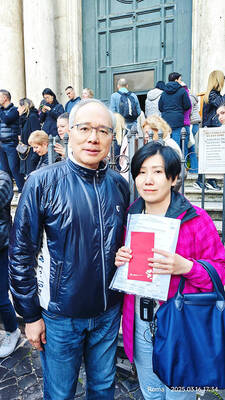
A Taiwanese woman on Sunday was injured by a small piece of masonry that fell from the dome of St Peter’s Basilica in the Vatican during a visit to the church. The tourist, identified as Hsu Yun-chen (許芸禎), was struck on the forehead while she and her tour group were near Michelangelo’s sculpture Pieta. Hsu was rushed to a hospital, the group’s guide to the church, Fu Jing, said yesterday. Hsu was found not to have serious injuries and was able to continue her tour as scheduled, Fu added. Mathew Lee (李世明), Taiwan’s recently retired ambassador to the Holy See, said he met
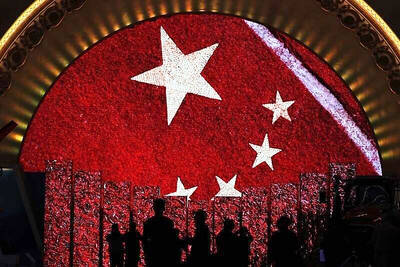
A BETRAYAL? It is none of the ministry’s business if those entertainers love China, but ‘you cannot agree to wipe out your own country,’ the MAC minister said Taiwanese entertainers in China would have their Taiwanese citizenship revoked if they are holding Chinese citizenship, Mainland Affairs Council (MAC) Minister Chiu Chui-cheng (邱垂正) said. Several Taiwanese entertainers, including Patty Hou (侯佩岑) and Ouyang Nana (歐陽娜娜), earlier this month on their Weibo (微博) accounts shared a picture saying that Taiwan would be “returned” to China, with tags such as “Taiwan, Province of China” or “Adhere to the ‘one China’ principle.” The MAC would investigate whether those Taiwanese entertainers have Chinese IDs and added that it would revoke their Taiwanese citizenship if they did, Chiu told the Chinese-language Liberty Times (sister paper
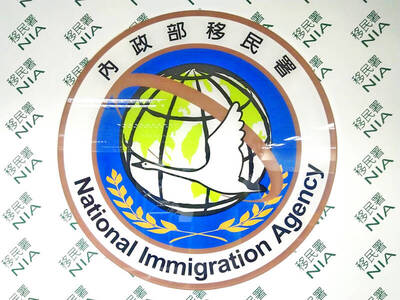
The Chinese wife of a Taiwanese, surnamed Liu (劉), who openly advocated for China’s use of force against Taiwan, would be forcibly deported according to the law if she has not left Taiwan by Friday, National Immigration Agency (NIA) officials said yesterday. Liu, an influencer better known by her online channel name Yaya in Taiwan (亞亞在台灣), obtained permanent residency via marriage to a Taiwanese. She has been reported for allegedly repeatedly espousing pro-unification comments on her YouTube and TikTok channels, including comments supporting China’s unification with Taiwan by force and the Chinese government’s stance that “Taiwan is an inseparable part of China.” Liu
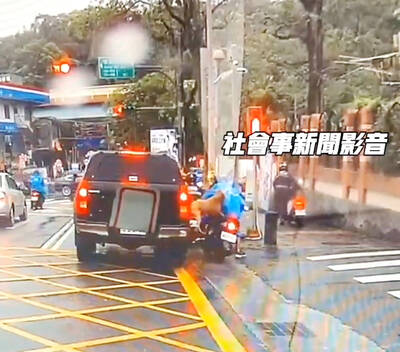
FATE UNKNOWN: The owner of the dog could face a fine of up to NT$150,000 and the animal could be euthanized if he cannot show that he can effectively supervise it A pit bull terrier has been confiscated by authorities after it yesterday morning bit a motorcyclist in Taipei, following footage of the same dog in a similar attack going viral online earlier this month. When the owner, surnamed Hsu (徐), stopped at a red light on Daan District’s (大安) Wolong Street at 8am, the dog, named “Lucky,” allegedly rolled down the automatic window of the pickup truck they were riding in, leapt out of the rear passenger window and attacked a motorcyclist behind them, Taipei’s Daan District Police Precinct said. The dog clamped down on the man’s leg and only let go